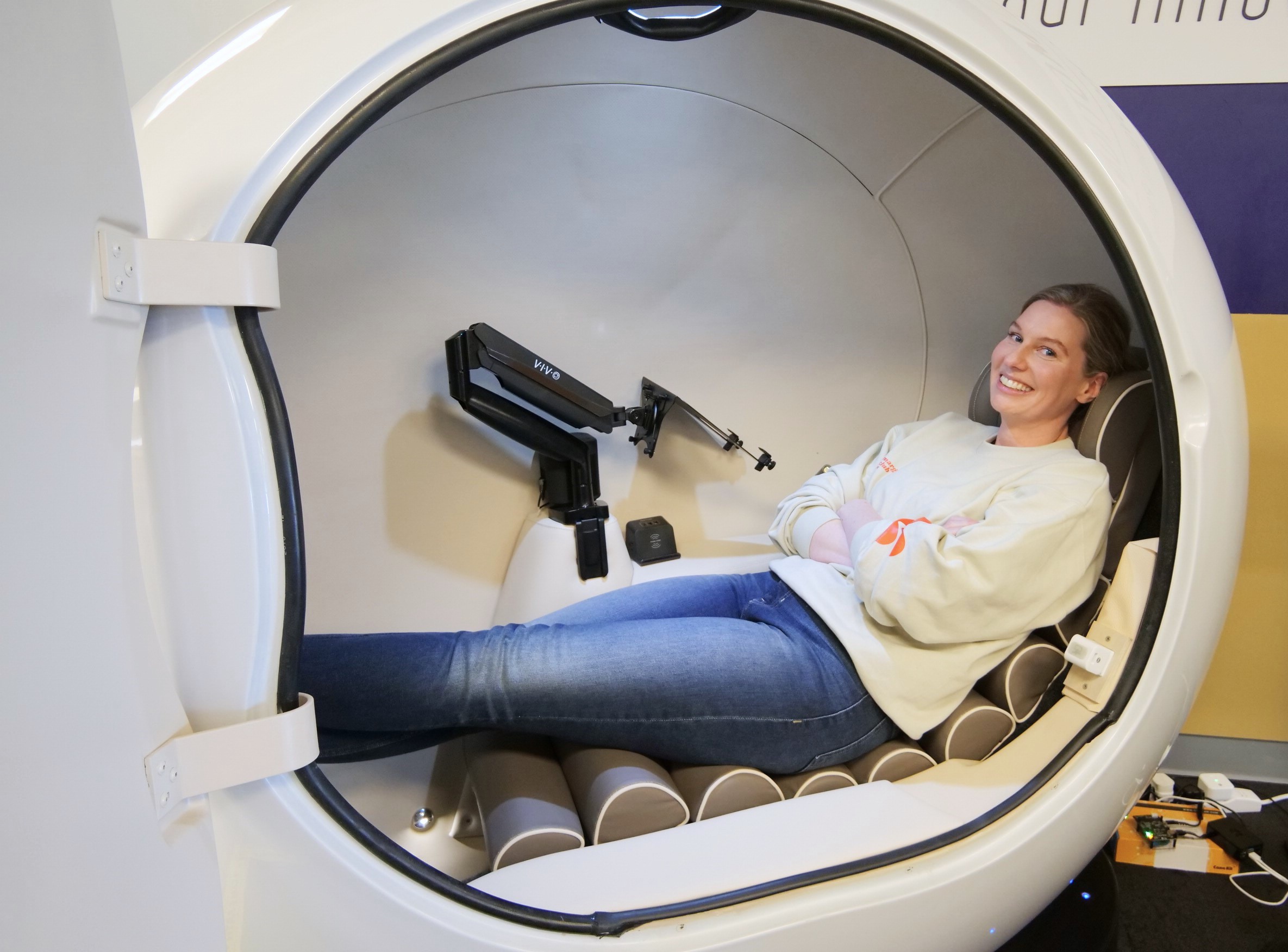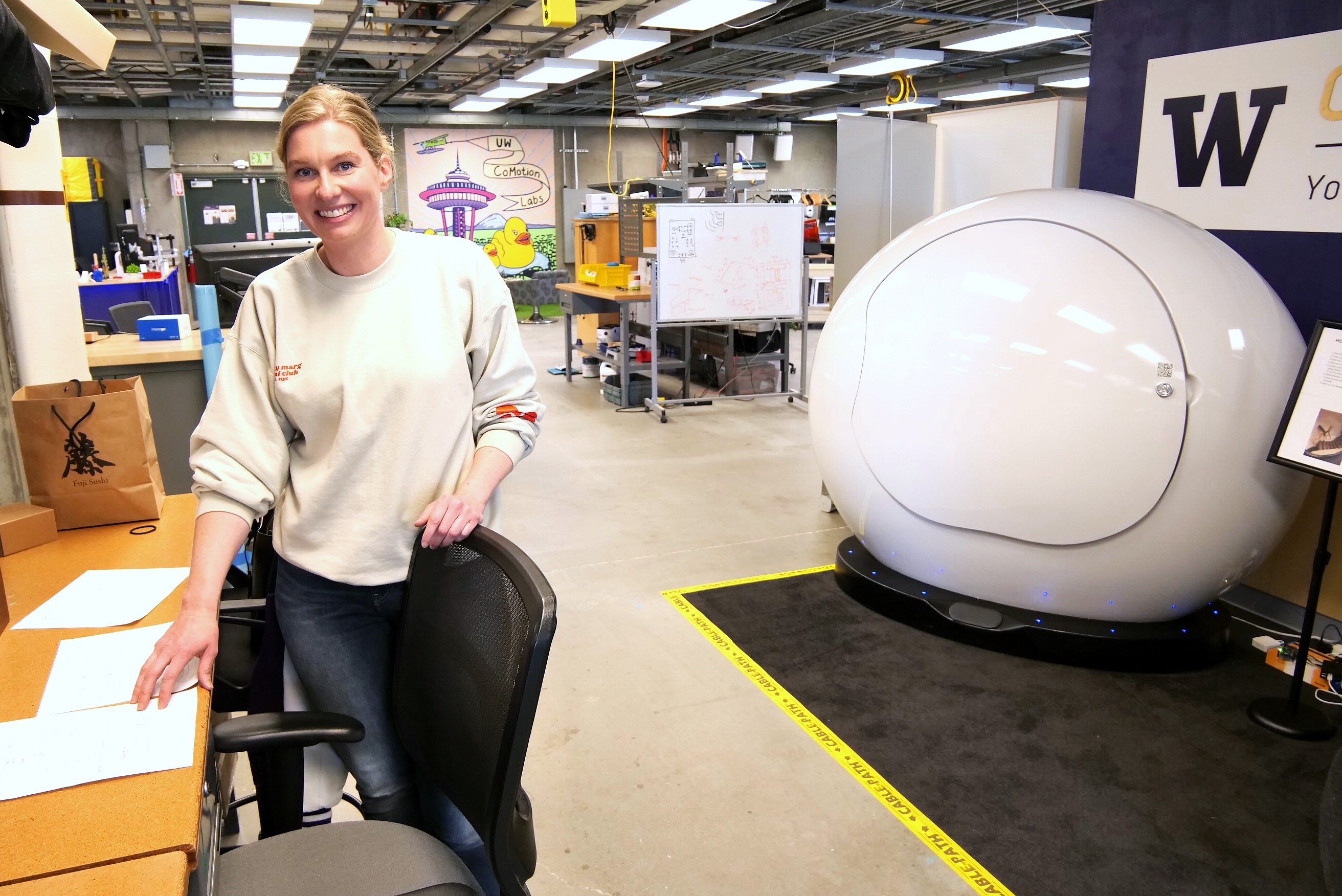
Stuck in an airport due to a layover or flight delay, people seeking a place to work or rest grapple with limited and elusive options — a seat at the gate, a table in the food court, a spot at the bar, a shared counter in the concourse, or a chair in the lounge, if they’re lucky. And good luck finding anything resembling peace and quiet.
A fledgling Seattle-based startup wants to give solo travelers a sanctuary instead.
The company, Sanctum, is developing pods with doors that provide fully enclosed, private spaces, with a cocoon-like spherical shape. They feature seats designed for napping or working, with built-in ventilation, electrical and USB charging ports, and other planned amenities for both relaxation and productivity.
The idea is to give people a private space on the go, paid for by the minute.

Based inside CoMotion Labs at the University of Washington, the company was started by hospitality industry veteran Juriana Spierenburg, Sanctum’s CEO and co-founder, who works as area hotel manager at citizenM hotels in Seattle. She has been joined by Jason Koo, who is CTO and co-founder. The founders met at a GeekWire event last year.
Sanctum’s goal is to deploy the prototypes initially at airports as a proof of concept, to gather feedback from users. Ultimately, the company also plans to roll out the pods in gyms and co-working spaces in urban areas. Other possibilities being explored by the company include offering the pods as workspaces for journalists at the 2026 FIFA World Cup.
Spierenburg was inspired to pursue the idea based on her own experience traveling solo in different cities and continents, during which she personally experienced problems that solo travelers face — high and fluctuating accommodation costs, lack of flexibility in accommodation options, and safety/security concerns.
“What I feel very strongly about is the flexibility of providing a space where you can relax or work,” Spierenburg explained. “And I feel very strongly about individual costs for solo travelers.”
The pricing will consist of an unlocking fee and a pay-per-minute model similar to bike-sharing, to give users more control over how much they pay. In a recent demo at CoMotion Labs, the initial price was listed as $1 to unlock, and 45 cents per minute of usage, which comes to $27 per hour. Users will unlock the pods and pay via the Sanctum app.
The business model will be based on profit-sharing arrangements with airports and other venues.
In that way, the idea is to help airports and other venues generate new revenue from unused or underutilized spaces. Spierenburg said this approach differs from another company, Boston-based Sleepbox, which was one of the winners at a 2017 startup contest held during an Airport Innovation Forum at Sea-Tac Airport. Sleepbox instead leased spaces up-front and ended up folding after it was locked into lease obligations when the pandemic hit.
By using profit-sharing instead, Sanctum’s business model is more similar to Jabbrrbox pods. But Spierenburg said Sanctum is differentiating itself, in part, with pods that can be used for either work or rest, depending on the user’s preference, rather than focusing on one or the other scenario.

As a business so far, Sanctum has been bootstrapped, without any outside funding. Spierenburg and Koo are both continuing to work in their full-time jobs, developing Sanctum in their free time, with the goal of turning the startup into a full-time business after landing their first airport contract.
For the initial prototypes, Sanctum plans to partner with janitorial services to clean the pods between use. Longer-term, the goal is to implement automated cleaning using elements such as robotics, UV light, and sanitizing spray.
Users will be able to see when a pod has been sanitized before entering, to ensure cleanliness.
Two initial prototypes have been adapted from an existing pod that was created by another company to give workers privacy in open-plan office spaces. The seat is fixed in a reclining position at an upright angle for napping, resting, or working on a laptop. Future designs are expected to offer fully reclining chairs more suitable for sleeping.
The interior space of the current prototype is around 100 cubic feet, and Spierenburg said the goal is to expand that to around 125 cubic feet in future designs of the Sanctum pod.
Even at its current size, people taller than 6 feet can fully extend their legs inside. Sitting inside, even with the door closed, the height of the pod makes it feel spacious. Spierenburg said she has drawn inspiration from the car industry, and how car designers have perfected the art of making small spaces feel comfortable for long periods of time.
“I want every one, of every size, to be comfortable,” she said.





